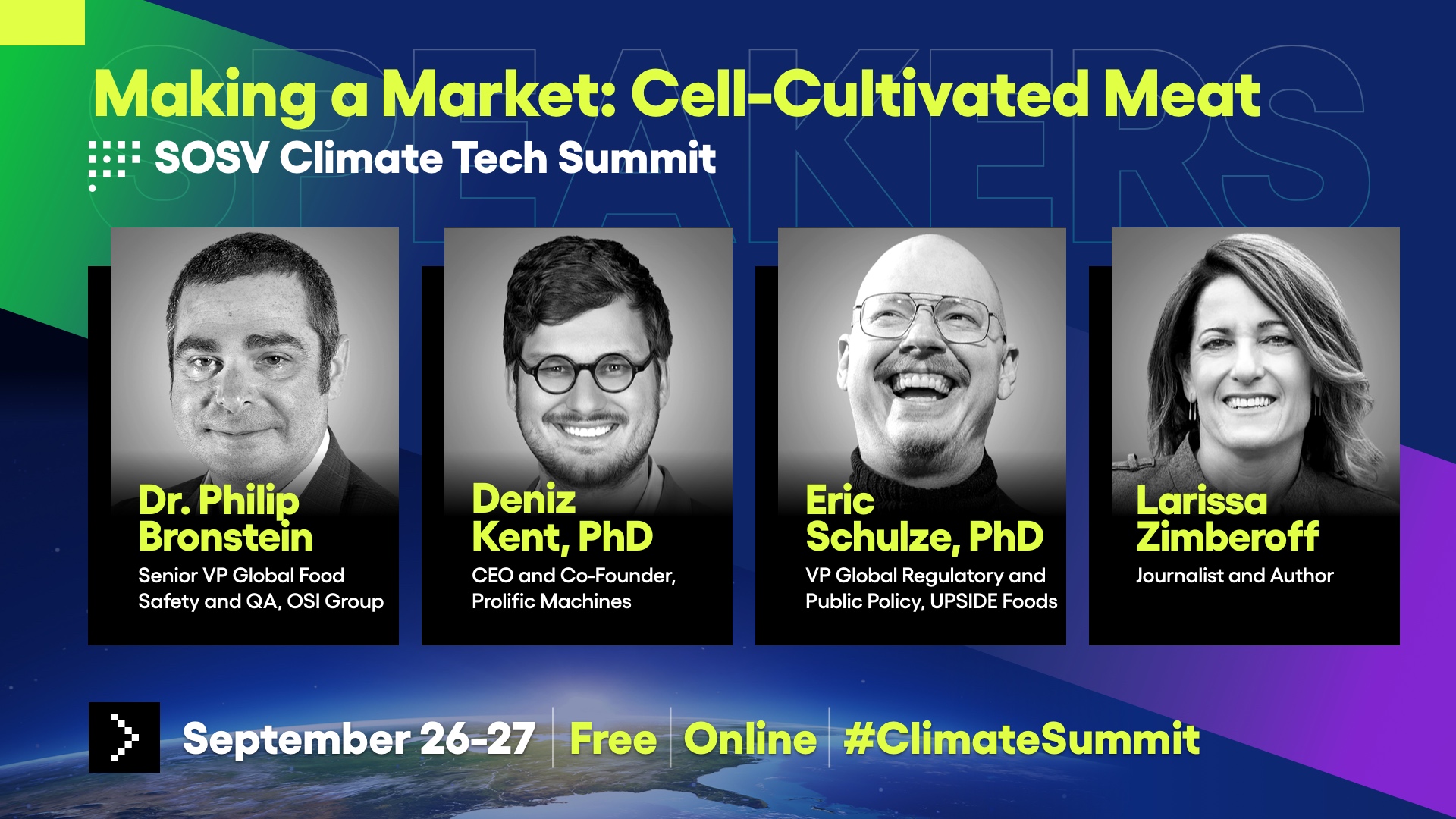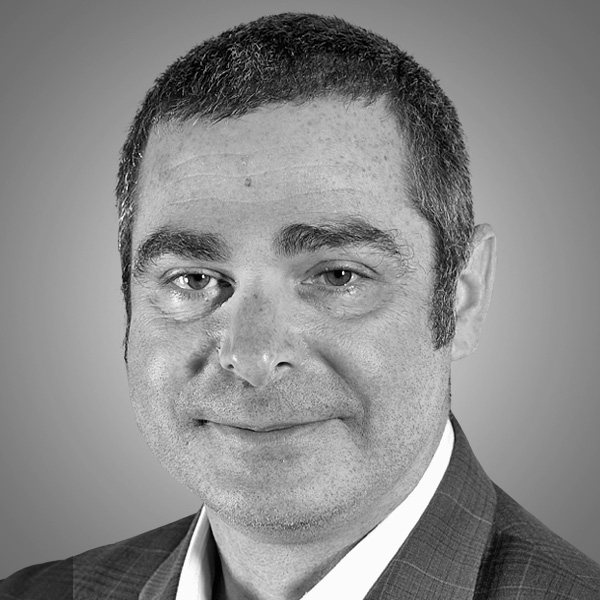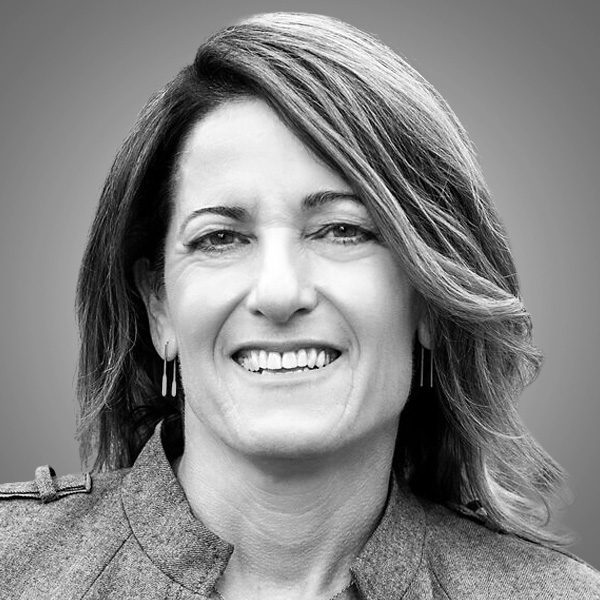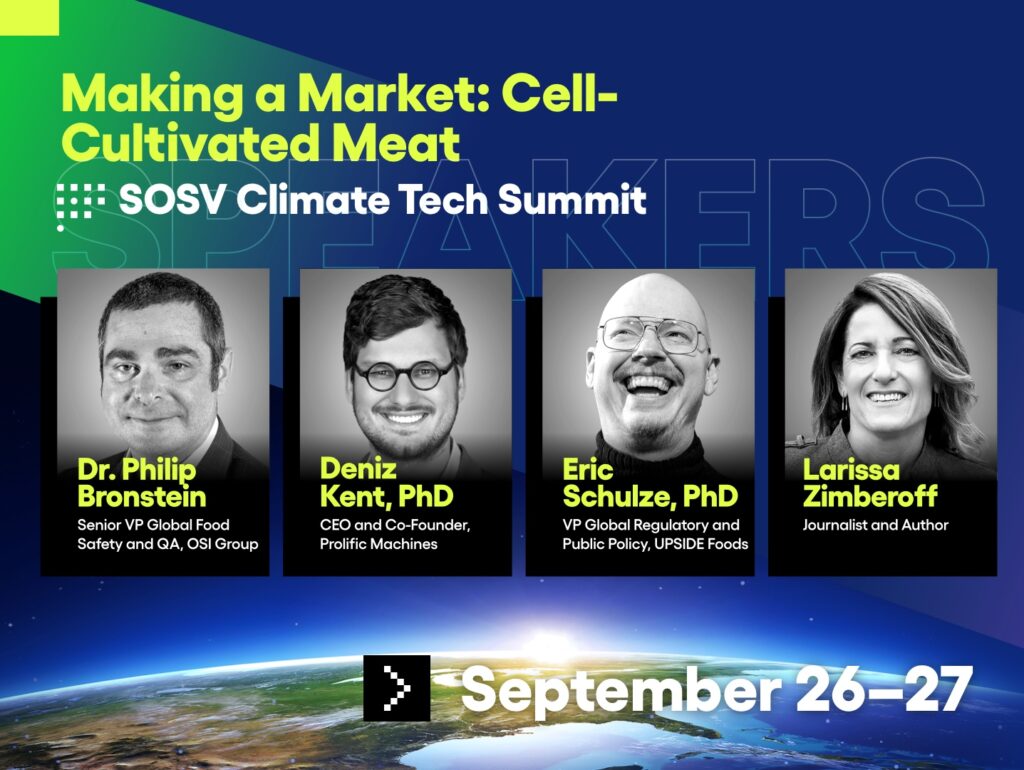
Now that the FDA and USDA have approved commercial sales of “cell-cultivated meat” in the United States (a first shared by UPSIDE Foods and GOOD Meat), what will it take to create a mass market? At the SOSV Climate Tech Summit (Sept 26-27 / free & virtual), we heard from entrepreneurs and regulatory experts.
The climate argument for cultured meat is compelling—but facing scrutiny. Globally, livestock account for 10 to 20% of greenhouse gas emissions, 80% of agricultural land (both for grazing and feed), and 10% of annually available fresh water. If food-grade (as opposed to pharma-grade) ingredients are used in the bioreactors for cultivated meat, researchers believe CO2e emissions could be 10 to 75 kg per 1 kg of cultured meat instead of the typical 100 kg CO2e for farmed beef.
Climate questions aside, cultured meat has challenges to overcome. Larissa Zimberoff, investigative reporter and our moderator for this panel, urges patience. Her recent article in Fast Company, “Why you won’t be eating cell-cultivated meat any time soon,” argues that the scale and costs of production have long ways to go before cultured meat can compete at grocery stores and everyday restaurants. For now, it’s only available at pricy prix fixe meals in San Francisco and Washington, D.C.
Encouragingly, incumbent meat processors are showing interest in cultured varieties. BioTech Foods, a subsidiary of Brazilian meatpacker JBS, recently broke ground on the world’s largest cultivated beef factory in Spain with a capacity of 1,000 metric tons per year. Unfortunately, that’s still a drop in the bucket. Spanish beef consumption is projected to reach 591,000 metric tons per year in 2026.
The “green premium” on cultured meat needs to become a “green discount” for mass market adoption. Our panelists will discuss what it might take to get there, from setting up new facilities to high throughput bioreactors to clean and low-cost growth media to texturing and more.
Born in IndieBio’s San Francisco basement, Prolific Machines is building a biological assembly line for cultured meat production. The secretive startup has figured out how to produce cultured meat at scale without using the two growth factors that normally account for almost 80% of the production cost. In just three years, Prolific has raised over $52 million from IndieBio, Mayfield, and Breakthrough Energy Ventures and a deep bench of celebrity investors. The team is cultivating wagyu beef in Emeryville, CA in what used to be a Jelly Belly factory. Prolific co-founder and CEO Deniz Kent, PhD joined the panel.
OSI Group, one of the world’s biggest meat processors with 65 facilities in 17 countries, is making moves in alternative proteins. Headquartered in Aurora, IL, the company built a name as one of McDonald’s meat suppliers. In 2019, OSI inked a co-manufacturing deal with Impossible Foods to boost production of its plant-based burgers. Could cell-cultivated meats be next for OSI? Philip Bronstein, PhD, Senior Vice President Global Food Safety and Quality Assurance at OSI Group, spoke on the panel.
UPSIDE Foods, an IndieBio graduate and unicorn, earned FDA and USDA approval to sell cultured chicken commercially. Since launching in 2015, the Berkeley, CA-based company has raised over $600M from investors including Temasek, Abu Dhabi Growth Fund (ADG), John Doerr, Bill Gates, Cargill, and Tyson Foods. While UPSIDE has won over three-star-Michelin Dominique Crenn, who now serves UPSIDE chicken at Bar Crenn, the company will need lower prices to win over everyday meat eaters. Eric Schulze, PhD, VP Global Regulatory and Public Policy at UPSIDE Foods, joined the panel.
What breakthroughs need to happen before cell-cultivated meats can compete worldwide against farmed meats?
The Speakers

Deniz Kent, PhD
Deniz Kent, PhD is the Co-founder and CEO of Prolific Machines. Prior to starting Prolific, Dr Kent spent his career working in the pursuit of improving human health. After studying Cellular and Molecular Medicine, he began researching in a tumor immunology lab, working to reprogram the immune system to fight cancer. After this, he went to GSK and worked to reprogram the immune system to respond to allergens with tolerance instead of inflammation. He did his doctorate in stem cell biology, and during his PhD he co-discovered a new liver stem cell, and conducted the world’s first high throughput screen on hiPSC-derived hepatocytes. During his PhD, Deniz conceived of the idea for Prolific Machines, a cell type agnostic assembly line for biomanufacturing. Applications for Prolific Machines span cultured meat, biologics manufacturing, cell based therapies, and beyond.

Dr. Philip Bronstein
Dr. Philip Bronstein is the Senior Vice President of Global Food Safety and Quality Assurance at the OSI Group. Prior to this position Dr Bronstein spent over 19 years with the USDA, holding positions in its Agricultural Research Service and Food Safety and Inspection service (FSIS). In 2015, Dr. Bronstein was selected as the Director of the OPHS Science Staff and provided microbiological and chemical residue support for the Agency and later served as Assistant Administrator of Field Operations with FSIS for over 4 years. One of his key achievements was to develop and implement a robust process to ensure that cell-cultured food products were properly inspected for US consumers. Dr. Bronstein holds a Bachelor of Science Degree in Microbiology from Texas A&M University and a Doctorate in Microbiology from the University of Washington.

Eric Schulze, PhD
Eric Schulze, PhD is a professional molecular biologist, genetic engineer, and former federal biotechnology regulator. He is currently Vice President of Global Regulatory and Public Policy at UPSIDE Foods. He previously served as Vice President of Product, where he led both design and development of the company’s meat products. Before that, he served as a U.S. Food and Drug Administration regulator, handling a portfolio of novel food and drug biotechnology products. As a civil servant, Dr. Schulze also served as a federal STEM education policy capacity within the National Science Foundation and currently works with the National Academy of Sciences on undergraduate STEM education transformation. He holds a doctorate in genetic, cellular, and molecular biology with a specialty in embryonic stem cell engineering and is trained in broadcast communication, speechwriting, and risk assessment.

Larissa Zimberoff
Larissa Zimberoff is an author and journalist covering the intersection of food, business and technology. Her book, Technically Food: Inside Silicon Valley’s Mission to Change What We Eat, is out now. She’s written on the promise of fake eggs, the potential of peas, and how artificial intelligence saved a winery. Her work has appeared in The New York Times, Wall Street Journal, Wired, Time, Bloomberg Businessweek, Insider and many more publications. She worked in the tech industry in San Francisco for over a decade before moving to the east coast and embarking on a new career. She received her MFA from The New School, and almost became a New Yorker after living there for seven years. Her decade spent working in tech helps her to translate the frenzy over today’s food startups. Her hard-earned belief in technology is matched by an equally precious hope for foods that come from the natural world.

